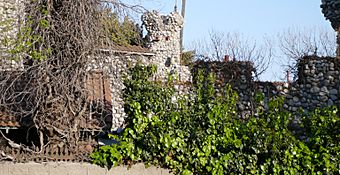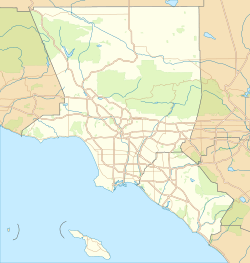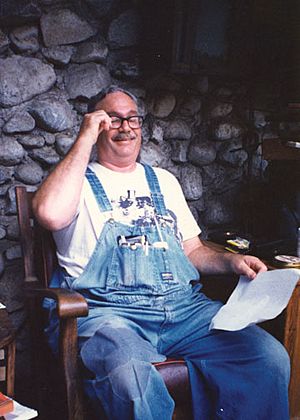Rubel Castle facts for kids
Quick facts for kids |
|
|
Rubel Castle Historic District
|
|
 |
|
| Location | 844 N. Live Oak Ave., Glendora, California |
|---|---|
| Built | 1959 to 1986 |
| Architectural style | Folk art environment |
| NRHP reference No. | 13000810 |
| Added to NRHP | October 7, 2013 |
Rubel Castle, also known as Rubelia, is a unique and amazing castle located in Glendora, California. It was built by a man named Michael Clarke Rubel. Today, the Glendora Historical Society owns and takes care of this special place.
Michael Rubel bought the land in 1959 when he was a teenager. The property had an old water tank and a building used for packing fruit. Michael loved building forts as a kid. He and his friends started building the castle, and they kept working on it until 1986.
Rubel Castle is made from concrete. But it also uses many unusual materials! Michael found things like scrap metal, rocks, old bedsprings, coat hangers, and bottles. He collected these items from his neighborhood as old farms were replaced by new houses. Even today, you can often see chickens and other animals roaming around the castle grounds.
The Story Behind the Castle
In 1959, Michael Rubel made a deal to buy the old Albourne Rancho property. He decided to live in the fruit packing house there. Michael's dad was a priest and also wrote jokes for a radio comedian.
In the 1960s, Michael's mom, Dorothy Deuel Rubel, moved into the packing house. She used to be an actress. She loved to throw parties there. Hundreds of guests would come each week. The packing house became a giant dance hall, filled with art and old furniture. People would dance to live music. Because of these fun parties, the packing house became known as "The Tin Palace."
Many famous people visited "The Tin Palace" during that time. These included Dwight Eisenhower, who later became president, and famous movie director Alfred Hitchcock. Another castle builder, Jirayr Zorthian, was a friend and helped with the project.
Building the Castle
Michael Rubel slept in one of the big fruit refrigerators. But the thick walls of cork were not enough to block out the noise from his mom's parties. So, in 1968, Michael started building a small hideaway. He built it inside an empty concrete water tank that could hold 145,000 gallons!
He used cement and old champagne bottles for the walls. The walls of the water tank helped keep things private and quiet while he built his bottle house. This building project lasted for 20 years. It eventually became what we now call Rubel Castle.
Starting in 1968, Michael, with the help of his friends and family, kept building. The castle grew to be thousands of square feet. Some of its towers are five stories high! Michael and his helpers built the castle without any special architectural plans. They used materials they found, like river rocks, cement, steel, aluminum, old telephone poles, and wine bottles.
You can even spot some really strange items sticking out of the castle walls! These include old motorcycles, tires, rubber gloves filled with sand, a camera, a golf club, and even a toaster.
One of the tall towers has a restored clock from 1911. This clock runs brass bells and tells the time. The tower is about 74 feet (22.5 meters) high. In the middle of the property, there's an old train car called a caboose from the 1940s. There are also old trucks and tractors. You might also see a "cemetery" with old marble tombstones, but don't worry, there are no real graves there!
Rubel Castle's Legacy
The castle has welcomed many important guests over the years. These include Prince Philip, Duke of Edinburgh, former president Dwight D. Eisenhower, and other important leaders.
In March 2005, Michael Rubel gave the castle to the Glendora Historical Society. This means they now take care of it and make sure it stays special for everyone to enjoy.
Many TV shows, music videos, and movies have been filmed at Rubel Castle. These include the TV show Heroes and Our Flag Means Death. A commercial for T-Mobile was also filmed there.
Rubel Castle was officially added to the National Register of Historic Places in 2013. This means it's recognized as an important historical place.
Gallery
See also
- Antoni Gaudí, a Spanish architect who built amazing buildings with a similar style, like the Sagrada Família in Spain.
- Hermit House, a unique home in Israel with detailed mosaics, built by one person over many years.
- Mystery Castle, a house in Arizona built in the 1930s with a similar creative style.
- Nitt Witt Ridge, another house in California built using unusual materials.
- Ferdinand Cheval, a French postman who built an "ideal palace" from rocks in his free time.
- Grandma Prisbrey's Bottle Village, another folk art place built with recycled materials.
- Watts Towers, a famous landmark in Los Angeles made from concrete and discarded items.
- Lummis House, a historic home in Los Angeles County built from river rocks and concrete.
- Abbey San Encino, a unique river rock house in Los Angeles, built by Clyde Browne.









